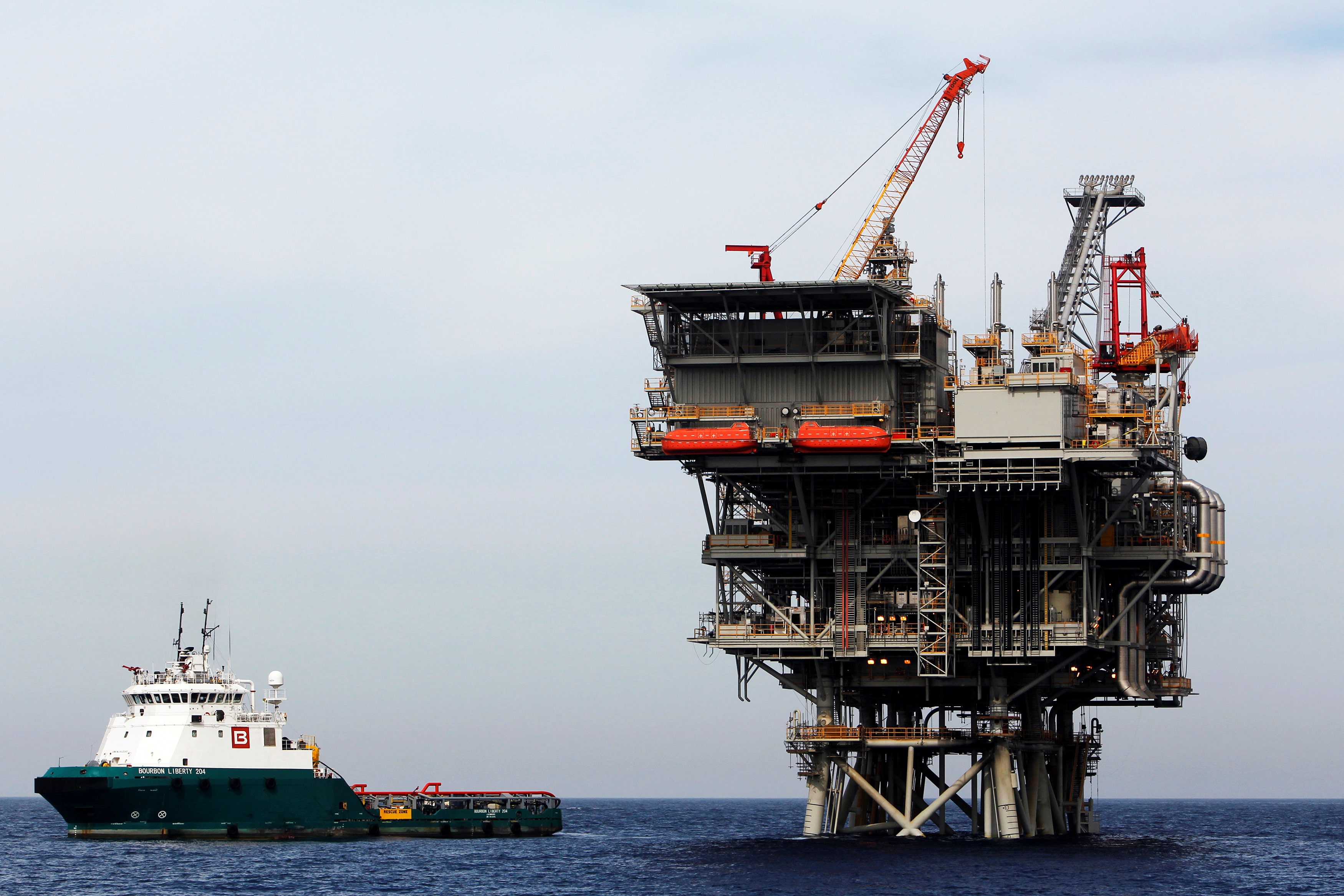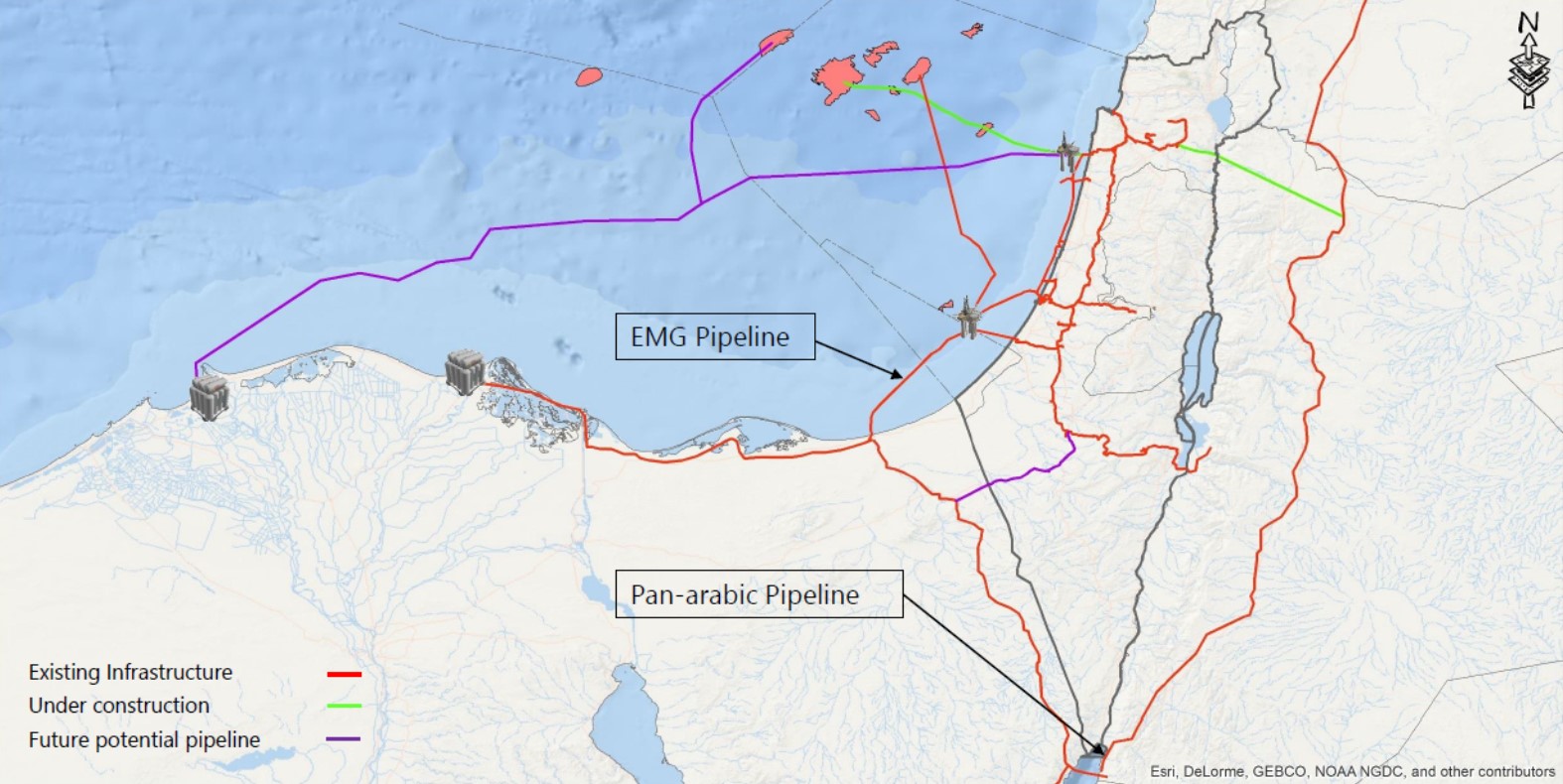Publications
INSS Insight No. 1098, October 15, 2018

On September 27, 2018, Delek Drilling, part of the Israeli-American consortium that owns natural gas concessions in Israel’s exclusive economic zone, announced the purchase of part of the company that owns the pipeline for transporting natural gas from Egypt to Jordan and Israel. As part of the deal, Delek also acquired the exclusive right to operate the 90 km pipeline from el-Arish to Ashkelon. The deal is important for Israel, given that the other options to sell and transport natural gas are now less feasible. It adds another welcome dimension to the positive development in the relations between Israel and Egypt, as it is important to diversify them beyond the close security cooperation.
On February 19, 2018, the Israeli-American consortium that owns natural gas concessions in Israel's exclusive economic zone (EEZ), including gas fields Tamar and Leviathan, announced an agreement with the Egyptian Delphinus company. According to the agreement, estimated at $15 billion, an annual 3.5 BCM will be sold from each field, beginning in 2019. As such, Tamar, which is already active, and Leviathan, are together to supply 64 BCM over the next decade.
On September 27, 2018, Delek Drilling, part of the consortium, announced that East Mediterranean Pipeline (EMED) - 25 percent of whose shares are owned by Delek - purchased 39 percent of the Egyptian company Eastern Mediterranean Gas (EMG) for $518 million. EMG is among the owners of the pipeline for transporting natural gas from Egypt to Jordan and Israel: one pipeline transports gas in Egypt to el-Arish, and from there the pipeline divides into two, with one line running from el-Arish to Aqaba, and one line running from el-Arish to Ashkelon. The repeated damage to these pipelines by local terrorist groups ended the flow of the gas from Egypt to its neighbors, although the section from el-Arish to Ashkelon remained intact. As part of the deal, Delek acquired the exclusive right to operate the 90 km pipeline from el-Arish to Ashkelon. The final conclusion of the deal is conditioned on various Egyptian and Israeli governmental approvals, operational checks and repairs, and upgrades that have the potential capacity to increase the annual flow capacity, from 7 to 9 BCM, which will cost about $30 million. In an interesting twist, the final deal may also include the use of the el-Arish-Aqaba pipeline to supply Israeli gas to Egypt.
By purchasing a stake in the Egyptian pipeline, the Israeli-American consortium took a bold risk to assure the implementation of the ten-year supply agreement. But beyond the economic aspects, there are also political implications to the deal. For the time being, the only non-Israeli buyers of Israel's natural gas are Egypt, Jordan, and the Palestinians. Of about 400 BCM that are or will be available for export, according to a decision by the Israeli government, only about 115 BCM have been committed. The deals with these three export markets are commercially sound, but subject to political and security risks and possible commercial competition. In the absence of any other available market, Egypt is the largest market for Israel’s gas - as long as Egypt’s own resources do not meet its own needs. The Zohr field will ultimately provide most of the domestic demands, and the projections regarding three different fields (West Nile Delta, Nooros, Atol) are promising. The quantities arriving from Israel may be used as a stopgap until the Egyptian supply meets demand, expected in 2019-2020. Yet even then, the recent deal between Israel and Egypt is significant because of the option to direct the Israeli gas to Egypt's offshore liquefaction installations. The deal may also bring about the resolution of a commercial dispute between the Israel Electricity Company (IEC) and EMG and a group of Egyptian companies, concerning compensation for the gas not supplied by the Egyptian side.

Welcoming the deal on September 27, 2018, the Egyptian Ministry of Petroleum explained its approval of the deal, including "finally in view of the Ministry's efforts to settle the pending disputes with investors under terms that are beneficial to all the parties." Indeed, the announcement by Delek Drilling includes a statement that the previous owners of EMG have dropped their claims against the Egyptian government and the companies it owns. This announcement does not refer to the IEC claim, which together with the EMG claim, was brought to adjudication of the International Court of Arbitration; in December 2015 the Court awarded $1.76 billion to IEC and $324 million to EMG. EMG also won a decision in an Egyptian court for compensation from the Egyptian government, although to date has not received any payment. Though the dispute is commercial, the governments of Israel and Egypt have a definite interest in preventing it from becoming a thorn in their otherwise enhanced cooperation, and the recent agreement is certainly a step in this direction. As to the security of the pipeline, the Egyptian government increased its efforts to combat groups in Sinai that attacked the army and police forces, as well as assets such as the pipeline. However, renewed sabotage attempts cannot be ruled out.
The agreements to sell gas to Egypt and purchase partial control of the pipeline are particularly welcome, given that the other options for Israel to sell and transport natural gas are now less feasible. The Turkish market would have been an attractive option for Israeli and East Mediterranean natural gas. Nevertheless, the political unpredictability of the current political regime in Turkey, including its attitude toward Israel, the lack of political stability in Lebanon and Syria, and the absence of a political solution to the conflict in Cyprus make the sale of natural gas to Turkey and the use of Turkey as a hub far too risky for political and security reasons. In turn, the unstable economic conditions in Turkey reduce the attractiveness of this export option.
The third option, of stretching a pipeline from the eastern shores of the Mediterranean through Cyprus to Greece, is technically very difficult and politically subject to some of the problems related to the dispute in Cyprus. It is also financially dependent on other East Mediterranean producers willing to share its capacity with Israel, to justify the enormous financial investment required. Such a project would create political and economic benefits for Israel, as it would ensure a large and stable market, add an important dimension to Israel's otherwise wobbling relations with the EU, and increase the stability in the East Mediterranean, with all the producers and users of such a pipeline interested in the revenues resulting from its safe and continuous functioning. This is, however, at best a long term project, especially considering that several preconditions for its feasibility do not exist.
Thus, the Egyptian option - whether as a market or a bridge for export of liquefied gas to Europe - is the only current viable option for exporting Israel's natural gas. It adds another dimension to the positive development in the relations between Israel and Egypt, as it is important to diversify them beyond the close security cooperation. But buying a stake in the Egyptian pipeline, in addition to the future sale of gas, still entails certain risks. Israel's current relations with Egypt are probably better than ever, but the implementation of gas deals were signed by commercial companies is subject to the Egyptian government’s political considerations. Second, the Egyptian natural reserves could expand significantly, and this in turn could influence the Egyptian considerations regarding either gas purchase or the availability of liquefaction capacity in their installations.
Not much discussion takes place about the gas off the Gaza Strip (the Gaza Marine field), due to the very modest quantity - an estimated 30 BCM, Gaza’s dire current economic plight, and the area’s unclear political future. Egypt’s respective talks with Israel, the Palestinian Authority, and Hamas, aimed at stabilizing the situation in Gaza, can both assist and be assisted by discussing programs intended to enhance the economic situation, including the exploitation of the Gaza Marine field. Natural gas from Gaza could be sold either to Israel or Egypt, by adding a short section to the el-Arish-Ashkelon pipeline. Gaza and the West Bank would be connected to the Israeli grid, avoiding the extensive investment required by connecting Gaza Marine directly to Gaza and West Bank.
Given the poor prospects of other options, the need to increase the sales of natural gas in Israel itself and to external markets in order to justify the investments needed for the development of the Leviathan field, and also to diversify the areas of Israeli-Egyptian relations, the purchase of the rights in the el Arish-Ashkelon pipeline is an important and timely step.


